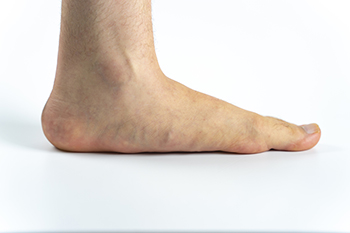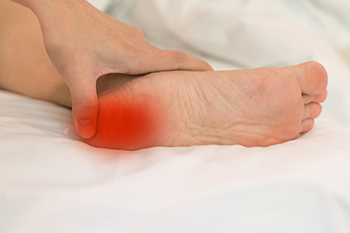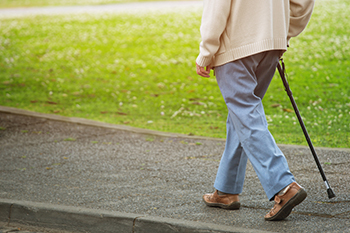
 When the feet are pressed flat while standing, this can often be a result of the condition known as flat feet or fallen arches. Usually, flat feet are not serious and do not need treatment. They should not interfere with your daily physical activities either. However, in more serious cases, patients with flat feet should consult with a podiatrist. Common reasons a podiatrist should be consulted include flat feet that are painful, stiff, or weak. Patients who have flat feet and often injure their feet or ankles, have a balance problem, or have only one foot that is affected, should consult with a podiatrist as well. For certain cases of flat feet, surgery may be necessary, but in most cases, a podiatrist will be able to suggest proper footwear and exercises in order to treat this condition.
When the feet are pressed flat while standing, this can often be a result of the condition known as flat feet or fallen arches. Usually, flat feet are not serious and do not need treatment. They should not interfere with your daily physical activities either. However, in more serious cases, patients with flat feet should consult with a podiatrist. Common reasons a podiatrist should be consulted include flat feet that are painful, stiff, or weak. Patients who have flat feet and often injure their feet or ankles, have a balance problem, or have only one foot that is affected, should consult with a podiatrist as well. For certain cases of flat feet, surgery may be necessary, but in most cases, a podiatrist will be able to suggest proper footwear and exercises in order to treat this condition.
Flatfoot is a condition many people suffer from. If you have flat feet, contact the podiatrists from The Foot & Ankle Center of New Jersey. Our doctors will treat your foot and ankle needs.
What Are Flat Feet?
Flatfoot is a condition in which the arch of the foot is depressed and the sole of the foot is almost completely in contact with the ground. About 20-30% of the population generally has flat feet because their arches never formed during growth.
Conditions & Problems:
Having flat feet makes it difficult to run or walk because of the stress placed on the ankles.
Alignment – The general alignment of your legs can be disrupted, because the ankles move inward which can cause major discomfort.
Knees – If you have complications with your knees, flat feet can be a contributor to arthritis in that area.
Symptoms
Treatment
If you are experiencing pain and stress on the foot you may weaken the posterior tibial tendon, which runs around the inside of the ankle.
If you have any questions please feel free to contact our office located in Paramus, NJ . We offer the newest diagnostic and treatment technologies for all your foot and ankle needs.
 When children between the ages of 8 and 14 struggle with heel pain, it is often a result of Sever’s disease. This occurs when the bones in the calves grow slightly quicker than the Achilles tendon (which connects the calf muscles to the heel bone). When this happens, the tendon tightens and the bones in the heels become swollen and sore. As the child continues to grow, there is thankfully no long-term damage caused by Sever’s disease. Common signs of Sever’s disease include limping, tenderness in the heel, and swelling in the heel bone, particularly after running and jumping activities. Parents who believe that their child is suffering from Sever’s disease should consult with a podiatrist for a proper diagnosis and treatment.
When children between the ages of 8 and 14 struggle with heel pain, it is often a result of Sever’s disease. This occurs when the bones in the calves grow slightly quicker than the Achilles tendon (which connects the calf muscles to the heel bone). When this happens, the tendon tightens and the bones in the heels become swollen and sore. As the child continues to grow, there is thankfully no long-term damage caused by Sever’s disease. Common signs of Sever’s disease include limping, tenderness in the heel, and swelling in the heel bone, particularly after running and jumping activities. Parents who believe that their child is suffering from Sever’s disease should consult with a podiatrist for a proper diagnosis and treatment.
Sever's disease often occurs in children and teens. If your child is experiencing foot or ankle pain, see the podiatrists from The Foot & Ankle Center of New Jersey. Our doctors can treat your child’s foot and ankle needs.
Sever’s Disease
Sever’s disease is also known as calcaneal apophysitis, which is a medical condition that causes heel pain I none or both feet. The disease is known to affect children between the ages of 8 and 14.
Sever’s disease occurs when part of the child’s heel known as the growth plate (calcaneal epiphysis) is attached to the Achilles tendon. This area can suffer injury when the muscles and tendons of the growing foot do not keep pace with bone growth. Therefore, the constant pain which one experiences at the back of the heel will make the child unable to put any weight on the heel. The child is then forced to walk on their toes.
Symptoms
Acute pain – Pain associated with Sever’s disease is usually felt in the heel when the child engages in physical activity such as walking, jumping and or running.
Highly active – Children who are very active are among the most susceptible in experiencing Sever’s disease, because of the stress and tension placed on their feet.
If you have any questions, please feel free to contact our office located in Paramus, NJ . We offer the newest diagnostic and treatment technologies for all your foot and ankle injuries.
Athlete’s foot is a fungal infection of the skin on the feet. It is characterized by an itchy, red rash and dry, peeling skin on the feet. Athlete’s foot is highly contagious. Many people catch it by walking barefoot in public areas such as swimming pools, locker rooms, and showers. These environments are warm and moist making them the perfect breeding ground for fungi. You can also catch this fungal infection by sharing personal items like towels, socks, or shoes with an infected individual. Athlete’s foot can spread from your feet to other parts of the body as well, so it is best to treat the infection as soon as possible. If you have symptoms of athlete’s foot, please seek the care of a podiatrist.
Athlete’s Foot
Athlete’s foot is often an uncomfortable condition to experience. Thankfully, podiatrists specialize in treating athlete’s foot and offer the best treatment options. If you have any questions about athlete’s foot, consult with the podiatrists from The Foot & Ankle Center of New Jersey. Our doctors will assess your condition and provide you with quality treatment.
What Is Athlete’s Foot?
Tinea pedis, more commonly known as athlete’s foot, is a non-serious and common fungal infection of the foot. Athlete’s foot is contagious and can be contracted by touching someone who has it or infected surfaces. The most common places contaminated by it are public showers, locker rooms, and swimming pools. Once contracted, it grows on feet that are left inside moist, dark, and warm shoes and socks.
Prevention
The most effective ways to prevent athlete’s foot include:
Symptoms
Athlete’s foot initially occurs as a rash between the toes. However, if left undiagnosed, it can spread to the sides and bottom of the feet, toenails, and if touched by hand, the hands themselves. Symptoms include:
Diagnosis and Treatment
Diagnosis is quick and easy. Skin samples will be taken and either viewed under a microscope or sent to a lab for testing. Sometimes, a podiatrist can diagnose it based on simply looking at it. Once confirmed, treatment options include oral and topical antifungal medications.
If you have any questions, please feel free to contact our office located in Paramus, NJ . We offer the newest diagnostic and treatment technologies for all your foot care needs.
If you are one of the many Americans who have to stand all day at work, you may be looking for ways to reduce the strain and pressure your feet and legs have to endure on the job. One of the simplest things you can do is change your position throughout the day. Engage your core and make conscious adjustments to your posture periodically to shift body weight. Find shoes that feel great and support your heels and arches. Custom orthotics created by your podiatrist can further address your specific foot structure and help distribute weight more evenly across your feet. Check with your podiatrist about other techniques to alleviate foot stress while you are on the job and on your feet.
While working on the feet, it is important to take the proper care of them. For more information about working on your feet, contact the podiatrists from The Foot & Ankle Center of New Jersey. Our doctors will treat your foot and ankle needs.
Working on Your Feet
Standing on your feet for long periods of time can cause stress and pain in your feet. Your whole body may experience change in terms of posture, back pain, bunions, callouses and or plantar warts. There are ways to avoid these conditions with proper foot care, smart choices and correct posture.
Positive Changes
Negative heeled shoe – Choosing this shoe type places the heel slightly lower than the ball of the foot. These are great for overall foot health. Find shoes that fit you correctly.
Go barefoot – Our feet were not designed to be enclosed for all hours of the day. Try to periodically expose your feet to air.
Eliminate Pain
Foot Exercises – Performing simple exercises, incorporating yoga and doing stretches are beneficial. This will allow increased blood flow to the area and muscles of the foot.
Achilles tendon – Stretching the foot out flat on the floor will relax the calf muscles and tendon. These exercises can be performed almost anywhere. Make sure you add these exercises to your daily regimen.
With a little bit of this information and knowing more about foot health, you will notice changes. Foot stretches and proper footwear will help with pain and prevent further issues.
If you have any questions please feel free to contact our office located in Paramus, NJ . We offer the newest diagnostic and treatment technologies for all your foot and ankle needs.
Peripheral artery disease (PAD) is a circulatory disease that narrows arteries and restricts blood flow in the extremities. This can cause cramping in the legs when exercising, which usually subsides when you stop. PAD can also cause pain, numbness, swelling, and discoloration in the feet, and can be a prelude to more dangerous complications. One of the tests a podiatrist may use to test the blood flow through arteries and veins is a duplex ultrasound. There are two components to a duplex ultrasound. The first is traditional ultrasound which creates an image by bouncing sound waves off of blood vessels. The second is doppler ultrasound which measures sound waves reflected off of flowing blood to visualize its direction and speed. Duplex ultrasounds are non-invasive. The patient remains still as the podiatrist hovers a wand (transducer) over the area to be tested which sends out sound waves. These sound waves are then reflected back and translated into images. To learn more about PAD and various ways to test for it, please make an appointment with your local podiatrist.
Vascular testing plays an important part in diagnosing disease like peripheral artery disease. If you have symptoms of peripheral artery disease, or diabetes, consult with the podiatrists from The Foot & Ankle Center of New Jersey. Our doctors will assess your condition and provide you with quality foot and ankle treatment.
What Is Vascular Testing?
Vascular testing checks for how well blood circulation is in the veins and arteries. This is most often done to determine and treat a patient for peripheral artery disease (PAD), stroke, and aneurysms. Podiatrists utilize vascular testing when a patient has symptoms of PAD or if they believe they might. If a patient has diabetes, a podiatrist may determine a vascular test to be prudent to check for poor blood circulation.
How Is it Conducted?
Most forms of vascular testing are non-invasive. Podiatrists will first conduct a visual inspection for any wounds, discoloration, and any abnormal signs prior to a vascular test.
The most common tests include:
These tests are safe, painless, and easy to do. Once finished, the podiatrist can then provide a diagnosis and the best course for treatment.
If you have any questions, please feel free to contact our office located in Paramus, NJ . We offer the newest diagnostic and treatment technologies for all your foot care needs.
People with diabetes are at an increased risk of neuropathy, or nerve damage. Diabetics are frequently diagnosed with peripheral neuropathy, or nerve damage in the hands and feet. Symptoms of peripheral neuropathy in the lower limbs include tingling, pins and needles, numbness, pain, or increased sensitivity in the feet. In some cases, the feet may change shape due to nerve damage. Sores and diabetic foot ulcers, which can be difficult to detect and tend to heal slowly and poorly, are also very common. If you have diabetes, it is important to be vigilant of any foot or ankle symptoms. Seeing a podiatrist regularly can help manage existing symptoms, detect and treat any new problems, and maintain the health of your feet.
Neuropathy
Neuropathy can be a potentially serious condition, especially if it is left undiagnosed. If you have any concerns that you may be experiencing nerve loss in your feet, consult with the podiatrists from The Foot & Ankle Center of New Jersey. Our doctors will assess your condition and provide you with quality foot and ankle treatment for neuropathy.
What Is Neuropathy?
Neuropathy is a condition that leads to damage to the nerves in the body. Peripheral neuropathy, or neuropathy that affects your peripheral nervous system, usually occurs in the feet. Neuropathy can be triggered by a number of different causes. Such causes include diabetes, infections, cancers, disorders, and toxic substances.
Symptoms of Neuropathy Include:
Those with diabetes are at serious risk due to being unable to feel an ulcer on their feet. Diabetics usually also suffer from poor blood circulation. This can lead to the wound not healing, infections occurring, and the limb may have to be amputated.
Treatment
To treat neuropathy in the foot, podiatrists will first diagnose the cause of the neuropathy. Figuring out the underlying cause of the neuropathy will allow the podiatrist to prescribe the best treatment, whether it be caused by diabetes, toxic substance exposure, infection, etc. If the nerve has not died, then it’s possible that sensation may be able to return to the foot.
Pain medication may be issued for pain. Electrical nerve stimulation can be used to stimulate nerves. If the neuropathy is caused from pressure on the nerves, then surgery may be necessary.
If you have any questions, please feel free to contact our office located in Paramus, NJ . We offer the newest diagnostic and treatment technologies for all your foot care needs.
Falls are the leading cause of injury and hospitalizations in older adults across North America. Most falls occur in the home, due to slipping or stumbling. Falls can result in both minor and major injuries, from bruises and sprains to dislocations and fractures. Injuries sustained from a fall can make falling in the future more likely, as they can impair mobility and decrease an older adult’s self-confidence when it comes to getting around their home and community. There are several steps that you can take to prevent falls, including removing tripping hazards from the home, installing non-slip mats and grab bars in slippery areas, and using a mobility aid when needed. To learn more about preventing falls, please consult with a podiatrist.
Preventing falls among the elderly is very important. If you are older and have fallen or fear that you are prone to falling, consult with the podiatrists from The Foot & Ankle Center of New Jersey. Our doctors will assess your condition and provide you with quality advice and care.
Every 11 seconds, an elderly American is being treated in an emergency room for a fall related injury. Falls are the leading cause of head and hip injuries for those 65 and older. Due to decreases in strength, balance, senses, and lack of awareness, elderly persons are very susceptible to falling. Thankfully, there are a number of things older persons can do to prevent falls.
How to Prevent Falls
Some effective methods that older persons can do to prevent falls include:
Falling can be a traumatic and embarrassing experience for elderly persons; this can make them less willing to leave the house, and less willing to talk to someone about their fears of falling. Doing such things, however, will increase the likelihood of tripping or losing one’s balance. Knowing the causes of falling and how to prevent them is the best way to mitigate the risk of serious injury.
If you have any questions, please feel free to contact our office located in Paramus, NJ . We offer the newest diagnostic and treatment technologies for all your foot care needs.
 As the feet age and get older, they take a beating while supporting the body’s weight. As the skin gets older, it begins to lose elasticity as well which can lead to more blisters, cuts, and infections. Thankfully, there are a few things that the elderly can do to help care for their feet and prevent future issues. First off, it is important to keep the feet clean and dry. This will help reduce the chances of fungi forming and causing issues such as athlete’s foot or fungal nail infections. In order to prevent ingrown toenails, it is key to keep the toenails trimmed short and straight across. Maintaining a healthy weight is also key to keeping pressure off of the feet. Any sores or wounds should be monitored and checked by a podiatrist as well. If you are experiencing pain in the feet, or if you have questions about caring for your feet, consulting with a podiatrist is key to keeping your feet healthy for a long time.
As the feet age and get older, they take a beating while supporting the body’s weight. As the skin gets older, it begins to lose elasticity as well which can lead to more blisters, cuts, and infections. Thankfully, there are a few things that the elderly can do to help care for their feet and prevent future issues. First off, it is important to keep the feet clean and dry. This will help reduce the chances of fungi forming and causing issues such as athlete’s foot or fungal nail infections. In order to prevent ingrown toenails, it is key to keep the toenails trimmed short and straight across. Maintaining a healthy weight is also key to keeping pressure off of the feet. Any sores or wounds should be monitored and checked by a podiatrist as well. If you are experiencing pain in the feet, or if you have questions about caring for your feet, consulting with a podiatrist is key to keeping your feet healthy for a long time.
Proper foot care is something many older adults forget to consider. If you have any concerns about your feet and ankles, contact the podiatrists from The Foot & Ankle Center of New Jersey. Our doctors can provide the care you need to keep you pain-free and on your feet.
The Elderly and Their Feet
As we age we start to notice many changes in our body, but the elder population may not notice them right away. Medical conditions may prevent the elderly to take notice of their foot health right away. Poor vision is a lead contributor to not taking action for the elderly.
Common Conditions
Susceptible Infections
Diabetes and poor circulation can cause general loss of sensitivity over the years, turning a simple cut into a serious issue.
If you have any questions please feel free to contact our office located in Paramus, NJ . We offer the newest diagnostic and treatment technologies for all your foot and ankle needs.